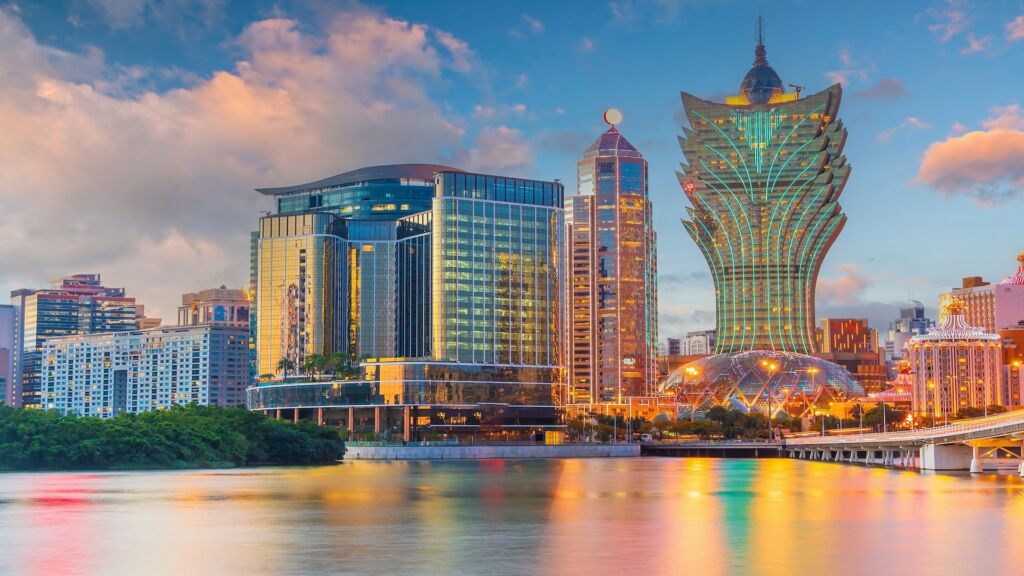Macau is a Special Administrative Region of China on the southern coast of Guangdong, at the Pearl River Delta. It covers 32.9 km² with about 713 000 residents. Official languages are Chinese (Cantonese) and Portuguese. The currency is the Macanese pataca (MOP), and the Hong Kong dollar is widely accepted. Drugs are strictly prohibited, with severe penalties for possession or trafficking. Alcohol may be purchased from age 18 in bars, restaurants and casinos.
History
Before the mid-16th century, the area consisted of Chinese fishing villages. In 1557 Portugal obtained a lease to establish a trading post. Macau remained under Portuguese administration until its handover to China on 20 December 1999, becoming a Special Administrative Region.
Industry
Gambling and tourism account for over 50 % of Macau’s GDP. Hospitality, retail and construction are also major sectors. Light manufacturing includes printing, beverage and textile production. Financial and insurance services are rapidly expanding.
Religion and races
Ethnic makeup: 88 % Chinese (Cantonese, Hakka and other groups), 4.6 % Filipino, 2.4 % Vietnamese, 1.7 % Portuguese and 2.8 % others. Religions: about 60 % follow folk beliefs, Taoism and Buddhism, 6 % are Catholic, 1 % Protestant, and 33 % non-religious. Traditions blend Chinese rituals with Portuguese Catholic festivals.
Interesting facts
Macau Tower hosts the world’s highest commercial bungee jump — 233 m. Scenes of the James Bond film “Casino Royale” were shot in the Historic Centre. The annual International Fireworks Display Contest sets multiple world records for duration and scale. Macau holds prestigious motorsport and golf events like the Macau Grand Prix.
Clothing
Light summer attire—T-shirts, shirts, linen or cotton trousers—is common. Very short skirts and mid-thigh shorts are discouraged in temples and streets. Casinos enforce a smart-casual dress code: no shorts, flip-flops or sleeveless undershirts. Hats and visors are popular under strong sun.
Living standards
Macau has one of the highest GDP per capita in the world (≈ 72 900 USD nominal, 128 000 USD PPP). Unemployment is below 2 %. The Human Development Index is very high (0.934). Corruption remains low thanks to stringent financial oversight.
Wars and conflicts
Macau has not been a major war zone in recent centuries. In the 17th century, the Dutch attempted a siege but failed. During World War II, Japanese forces occupied the territory without major combat.
Holidays
Lunar New Year (Jan–Feb): 3–5 days of parades and fireworks. Macau SAR Establishment Day (20 December): official ceremonies. Portuguese Carnival (Feb–Mar): costumed parades. Liberation Day (15 December): military parades and public festivities.
Traditions
Respect for elders and family cohesion is paramount. Offerings to ancestors and incense worship in temples are common. Visitors should cover shoulders and knees at religious sites and remove shoes where required. Tourists are advised to check ceremony schedules and avoid interrupting rituals.
Tourism
Tourism is Macau’s key economic sector. Around 40 million visitors arrive annually. Offerings include guided walks through the Historic Centre, night tours of casinos, international shows, food festivals and river cruises on the Pearl River.
Types of tourism
– Gaming and entertainment — integrated casino resorts on Cotai Strip
– Cultural-historical — Portuguese colonial heritage and Chinese temples
– Culinary — Portuguese, Cantonese and Macanese fusion cuisine
– MICE — world-class convention and exhibition facilities
– Adventure — bungee jumping and paragliding from Macau Tower
– Shopping — duty-free outlets and luxury boutiques
Tourist attractions
– Ruins of St. Paul’s — Macau’s iconic landmark.
– Senado Square — Portuguese mosaic pavement and street lamps.
– A-Ma Temple — the oldest Chinese temple in Macau.
– Macau Tower — observation deck and bungee jump.
– Venetian Macao — casino resort with Venetian canals.
– Cotai Strip — mega-resorts and shopping malls.
Non-touristy attractions
– Colonial houses in Taipa Village.
– Fish market at Koon Chong street with authentic cafés.
– Quiet parks and gardens on Coloane Island.
– Rice wine distillery “Macau Wine Co.”
– Morning qigong sessions along the Pearl River promenade.
Local cuisine
Egg tarts (“pastel de nata”), bacalhau cakes, Cantonese dim sum, Macanese noodle soup “fun choi.” Beverages: Portuguese wine, local rice wine and signature cocktails at “Rocks” bar. Breakfast 7–10, lunch 12–14, dinner 18–21. Must-try: African chicken and Chinese-style snails.
Why visit
Macau’s unique East-meets-West heritage, Old World atmosphere and ultramodern skyline offer diverse experiences: leisure, culture, gastronomy and entertainment in one compact destination.
Safety for tourists
Crime levels are very low. No terrorist threat. No wild animals. Emergency numbers: police 999, ambulance 110, fire 119. Extensive CCTV network and one of the most advanced surveillance systems globally.
Medicine
Healthcare quality is high — public and private hospitals with modern equipment. International travel insurance is accepted; pharmacies operate 24/7. Recommended vaccinations: hepatitis A and tuberculosis.
Service level
Accommodation ranges from world-class 5-star resorts to boutique hotels and guesthouses. Restaurants span street food stalls to Michelin-starred venues. Casino and retail customer service is premium-level.
Entry rules
Citizens of Russia and most countries enjoy visa-free entry for 30 days. Required documents: valid passport, return ticket and proof of accommodation. Duty-free import: up to 3 liters of alcohol, 400 cigarettes. Strictly prohibited: drugs, firearms, pornographic materials.
Transport
Public transit includes buses and metered taxis (base fare ~ 19 MOP). Intercity ferries and high-speed catamarans connect Macau with Hong Kong — tickets at terminals or online. The high-speed rail links Macau to Guangzhou and Beijing.
Automobile
Car rental available through international agencies. Left-hand traffic, well-maintained roads. No tolls. Zero-tolerance drink-drive policy. Speed limits: 50 km/h urban, 80 km/h rural. Speed cameras enforce red lights. Dashboard cameras are optional but helpful. Fines start at 1 000 MOP. Compact cars are feasible, though public transport is more convenient.
Noise regulations
Quiet hours from 23:00 to 7:00 in residential areas. On festive occasions and along the waterfront, noise may continue until 1:00 AM, but strict controls apply in living quarters.
Daily tourist budget
Budget — 400–600 MOP (~ 50–75 USD): hostel, street food, public transit. Comfort — 1 500–2 000 MOP (~ 190–250 USD): three-star hotel, cafés, tours. Premium — from 3 000 MOP (~ 375 USD): five-star resort, shows, private transfers.
What is not recommended or forbidden
No littering in streets or casinos, no photographing gaming tables without permission, no ostentatious display of wealth, no smoking in prohibited zones, no public brawls, no trespassing in restricted areas.
Climate
Subtropical monsoon climate. Hot, humid summers (28–35 °C) with rainy and typhoon season from June to September. Mild, dry winters (12–18 °C). Best travel season: October–December for comfortable temperatures and minimal rain.
Tips for tourists
Book accommodations well in advance for major festivals. Use the Macau Pass app to pay transit fares and small purchases. Monitor typhoon forecasts and carry a portable charger.
What to bring
Passport and copies, international bank cards (UnionPay), power adapter type C/G, lightweight rain jacket, comfortable walking shoes, sunglasses and sunscreen, basic first-aid kit and mosquito repellent.
- Somalia: A Country of Risk and Contrasts – Is It Worth Going?
- Holiday in Monaco
- Sahalin
- North Coast 500: a grand loop of Scotland’s Northern Highlands
- Visible from the Moon: Earth’s Most Monumental Wonders
- Alaska
- Birds
- Norway’s Atlantic Road scenic drive
- And in Africa the mountains are this high
- Istanbulkart Scams: What Tourists Should Watch Out For
- Belgium
- Brazil Travel Costs
- Brest (Belarus)
- Bali
- Niger
- Pura Vida on the Road: the nuances of traveling Costa Rica
- Sydney
- Morocco
- Cuba
- Treasure in the Cape Cod fog: A Thai traveler’s encounter with pirate history












